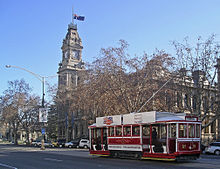| Bendigo tramway network | |||||||||||
|---|---|---|---|---|---|---|---|---|---|---|---|
 Tourist tram in the main street. Tourist tram in the main street. | |||||||||||
| Operation | |||||||||||
| Locale | Bendigo, Victoria, Australia | ||||||||||
| |||||||||||
| |||||||||||
Trams in Bendigo have operated since 1890. They ceased to operate as a means of public transport in 1972 but part of the main network continues to operate today as a tourist attraction. Limited trials have also been made in 2009 with operating commuter service, but with minimal usage by the public.
History
As public transport
The first trams in Bendigo were battery operated, but only lasted three months before being withdrawn due to their unreliability. A steam tram system commenced operation in 1892 operated by the Bendigo Tramways Company Limited, and lasted until 1902. Electric trams commenced in 1903 operated by the Electric Supply Company of Victoria, the network eventually covering two routes, one north-south from North Bendigo through the city centre to Golden Square, and Eaglehawk through the city centre to Quarry Hill.
The Electric Supply Company of Victoria was taken over by the State Electricity Commission of Victoria (SECV) in 1934, as part of the centralisation of the supply of electricity in Victoria. The SECV was in the power generation business, and did not want to operate the loss-making provincial tramways of Bendigo, Ballarat and Geelong, but was forced to by the State Government.
In 1957–58 tram passengers were paying an average fare of 3 cents while the service cost 8.75 cents to provide, and by 1961–62 the cost was 10 cents. Between 1961 and 1969 patronage fell 46 percent, but in 1968, the Legislative Council refused to give the SECV permission to abandon the service. It continued to be operated by the SECV until April 1972, when the Bendigo tramways were closed.
As a tourist tramway

In September 1972 a two-year trial of tourist tramways commenced by "The Bendigo Trust" trading as "Bendigo Tramways", and they remain in operation today. The service operates from North Bendigo though the city centre to the Central Deborah Gold Mine.
Between 1996 and 1998, a tourist restaurant and cafe trams was introduced to Bendigo, following the success of a similar model of the Colonial Tramcar Restaurant in Melbourne. The idea proved very popular and the Bendigo fleet has since increased in size.
In 2005 a proposal was put forward to the City of Greater Bendigo to extend the tourist tram route around Lake Weeroona, however the plan met staunch opposition from the community and it was ultimately rejected putting the viability of the network at risk.
In 2008, notable environmental scientist Peter Newman called for modernisation of the Bendigo tram network to operate as a form of public transport.

After calls from the community organisations and representatives, a week-long trial of commuter tram services began in December 2008, followed by a second trial between 16 March and 9 April 2009, with trams running every 20 minutes between North Bendigo, Golden Square and the CBD during the morning and afternoon peaks. Fares were set at A$2 a ride. The trials attracted good publicity and support from the Bendigo +25 Transport Action Group, but resulted in light patronage. The Bendigo Tramways concluded that the trial "showed that Bendigonians are still more comfortable using their cars", but should the need arise to reintroduce the trams as a commuter service, "we are certainly up to the task".
In February 2010 the Bendigo Tramways received $3.1 million to fund the redevelopment of the depot, workshop and administration building, as well as landscaping and heritage conservation, and safety works. This would mean a doubling in the capacity of the workshop, which also restores parts for heritage trams around the world.
See also
- Charing Cross tram stop
- Rail transport in Victoria
- Spider (locomotive) Bendigo Tramways locomotive moved to Tasmania
- Transportation in Australia
- Tram controls
- Trams in Australia
References
-
"Golden Jubilee for Bendigo Tram Service". The Age. 11 April 1953. p. 3. Retrieved 14 January 2014.
Bendigo's electric tramway service completes its 50th year of running tomorrow.
- ^ "Tram trial gets mixed results" (PDF). Tram Talk. Friends of the Bendigo Tramways. Autumn 2019. p. 4. Archived from the original (pdf) on 2 November 2010. Retrieved 7 July 2010.
- "Bendigo Tramways - History". www.bendigotramways.com. Retrieved 7 June 2008.
- "Bendigo's tram system". www.railpage.org.au. Archived from the original on 19 May 2008. Retrieved 7 June 2008.
- Edwards, Cecil (1969). Brown Power. A jubilee history of the SECV. State Electricity Commission of Victoria. pp. 202–204.
- Edwards, Cecil (1969). Brown Power. A jubilee history of the SECV. State Electricity Commission of Victoria. p. 238.
- "The Bendigo Trust". www.bendigotrust.com.au. Archived from the original on 17 June 2008. Retrieved 7 June 2008.
- "Bendigo ninesevensix - About". www.bendigoninesevensix.com.au. Archived from the original on 23 September 2007. Retrieved 7 July 2010.
- Hugh Martin (21 January 2005). "Future on line for Bendigo's historic trams". The Age. theage.com.au. Retrieved 7 July 2010.
- "Academic supports light rail scheme for Bendigo". ABC News. www.abc.net.au. 10 September 2008. Retrieved 7 July 2010.
- "Bendigo commuter tram trial begins". ABC News. www.abc.net.au. 16 March 2009. Retrieved 7 July 2010.
- "City of Greater Bendigo Calendar of Events". www.bendigo.vic.gov.au. March 19, 2009. Archived from the original on August 23, 2008. Retrieved July 7, 2010.
- The Bendigo Trust. "36th Annual Report, 2008/2009" (PDF). www.bendigotrust.com.au. Retrieved 7 July 2010.
- Darren Gray (8 February 2010). "Bendigo Tramways on right track for upgrade". The Age. theage.com.au. Retrieved 7 July 2010.